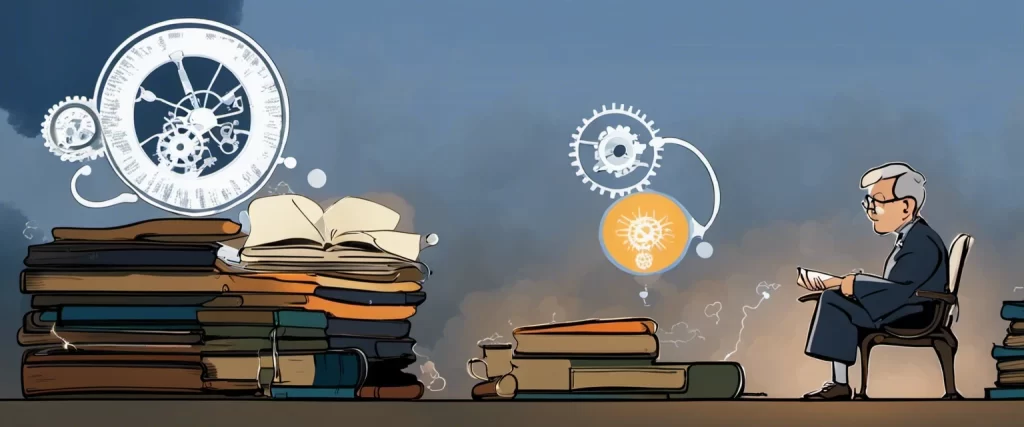—A Short History of Nearly Everything & A Brief History of Time
In the cosmic tapestry of our existence, there lies an insatiable desire to comprehend the enigmatic wonders of the Universe. Human curiosity, ever so vigilant, has fueled the quest for knowledge and understanding, giving birth to an array of scientific masterpieces that seek to demystify the universe we inhabit. Among these literary beacons, two works emerge as timeless classics: “A Short History of Nearly Everything” by Bill Bryson and “A Brief History of Time” by Stephen Hawking.
A veritable tour de force in the domain of popular science writing, both Bryson and Hawking embark on a gripping exploration, aimed at presenting the complexities of our world to a wide audience. They traverse the esoteric realm of scientific theories, transforming inaccessible concepts into tangible narratives, delicately woven with intellectual rigor and captivating storytelling. While their books may seemingly tread different paths – one delving into the depths of Earth’s history, the other venturing into the mysteries of the cosmos – they converge in their passionate pursuit of sharing scientific knowledge.
“A Short History of Nearly Everything” enraptures its readers by unfurling a captivating tapestry of discovery, delving into the realms of geology, paleontology, chemistry, and physics, and inviting us to behold the intricate story of our planet. Bill Bryson, acclaimed for his wit and engaging style, traverses eons with an effortless narrative, illuminating the endeavors of countless scientists who, through their ingenuity, have unraveled the mysteries of our past. From the Big Bang to plate tectonics, Bryson seamlessly integrates intricate scientific concepts with illuminating anecdotes, rendering even the most complex matters accessible to the layperson.
In contrast, “A Brief History of Time” propels its audience into the inky vastness of space, as the late and legendary physicist Stephen Hawking explores the enigmatic cosmos that surrounds us. Hawking, with his unparalleled intellect and scientific prowess, endeavors to bridge the gap between abstruse theories and the intellectual curiosity of common readers. His book invites us to ponder the ultimate questions of existence itself, contemplating the origin of the Universe, the nature of time, and the existence of black holes, as we strive to glimpse into the profound mysteries that lie beyond our reach.
In this comparative study, our exploration will delve into the captivating narratives presented in “A Short History of Nearly Everything” and “A Brief History of Time.” We will scrutinize the distinctive approaches employed by Bill Bryson and Stephen Hawking to mold their scientific knowledge into gripping tales. With an eye towards their distinct stylistic choices, thematic nuances, and the accessibility of complex ideas, we will navigate their celestial corridors, endeavoring to discern the shared essence that makes these works invaluable contributions in arousing our awareness and appreciation for the profound wonders of the Universe.

As we embark upon this literary odyssey, we invite you, our readers, to join us on an expedition through time and space, guided by the words and wisdom of Bill Bryson and Stephen Hawking. Together, we shall unravel the enigmatic threads that weave these scientific masterpieces and unravel the profound truths that reside within them.
Brief Summary of Two Books
A Short History of Nearly Everything by Bill Bryson
“A Short History of Nearly Everything” by Bill Bryson is a captivating exploration of the history and vast complexities of science, spanning from the origins of the universe to the evolution of life on Earth. Bryson skillfully breaks down complex scientific concepts into accessible and enjoyable narratives, providing fascinating anecdotes about the people behind significant scientific discoveries. He delves into a wide range of topics such as the Big Bang, the formation of galaxies, plate tectonics, the human body, and much more. With his characteristic wit and humor, Bryson offers an enlightening and thought-provoking journey through the wonders of our world and the incredible advancements of human knowledge.
A Brief History of Time by Stephen Hawking
“A Brief History of Time” by Stephen Hawking is a popular science book that explores the fundamental concepts of the universe and its origins. It delves into topics such as the Big Bang theory, black holes, the nature of time, and the possibility of theoretical unified laws that can explain everything in the universe. The book discusses complex scientific ideas in a simplified manner to make it accessible to the general audience. It aims to answer questions about the nature of the universe and our place within it, compelling readers to undertake a journey through space, time, and the mysteries of the cosmos.
Comparison between Two Books

Similarities in scientific exploration
“Parallel A Short History of Nearly Everything” by Bill Bryson and “A Brief History of Time” by Stephen Hawking both delve into the realms of scientific exploration and provide intriguing insights into different aspects of the universe. Although they approach the subject matter from different angles, they exhibit similarities in their focus on topics such as the origin of the universe, the nature of time, and the quest for scientific understanding.
1. Origins of the Universe: Both books touch upon the origins of the universe and bring attention to the big questions surrounding it. Bryson explores the birth of the universe in “A Short History of Nearly Everything,” discussing the Big Bang theory and the development of galaxies. Similarly, Hawking delves into the origins of the universe in “A Brief History of Time,” examining concepts such as the singularity and the expansion of the universe.
2. Scientific Discoveries: Both authors highlight significant scientific breakthroughs throughout history. Bryson presents numerous examples of pivotal discoveries, including those made by scientists such as Isaac Newton and James Hutton. Hawking, in his book, outlines landmark scientific findings that have contributed to our understanding of the universe, such as Einstein’s theory of relativity and the discovery of black holes.
3. Scientists and their Contributions: In both books, the authors emphasize the significant contributions of various scientists to the field of scientific exploration. Bryson delves into the lives and works of scientists like Marie Curie and Charles Darwin, shedding light on their groundbreaking research. Similarly, Hawking discusses the theories and experiments conducted by prominent figures like Albert Einstein and Galileo Galilei, underscoring their impact on scientific understanding.
4. Complexity and Mystery: Both books acknowledge the complexity and mysteries that continue to challenge scientists. Bryson acknowledges the vastness of the universe and the limits of human comprehension in understanding its intricacies. Likewise, Hawking addresses the enigmatic nature of black holes, the concept of time, and the search for a unifying theory, admitting that many aspects of the universe remain puzzling and unanswered.
5. Scientific Endeavor: Bryson and Hawking both express the immense curiosity and drive behind scientific exploration. They emphasize the relentless pursuit of knowledge demonstrated by scientists throughout history, highlighting the passion and determination required to uncover the secrets of the universe.
In summary, both “A Short History of Nearly Everything” by Bill Bryson and “A Brief History of Time” by Stephen Hawking share similarities in their exploration of scientific concepts and the pursuit of understanding the universe’s origins. They both delve into the significant scientific achievements, acknowledge the complexity of the subject matter, and underscore the dedication of scientists in unraveling the mysteries of the universe.
Divergences in scientific exploration
A Short History of Nearly Everything by Bill Bryson and A Brief History of Time by Stephen Hawking are both renowned science books that explore the history of our universe and scientific theories. While they share similarities in their aim to present complex scientific concepts to a broad audience, there are noticeable divergences in their approaches to scientific exploration.
One prominent divergence between the two books lies in their authors’ backgrounds. Bill Bryson, though not a professional scientist, brings his skill as a gifted storyteller to unravel the mysteries of science. He approaches scientific exploration with curiosity and a light-hearted writing style, making complicated topics accessible to the general reader. On the other hand, Stephen Hawking, a renowned theoretical physicist, delves deeper into complex scientific theories and concepts, providing readers with a more technical understanding of the subject matter. His book often requires readers to engage actively and think critically about the content, as they navigate through intricate scientific explanations.
Another significant divergence is the scope of scientific exploration covered. Bryson’s A Short History of Nearly Everything aims to provide a comprehensive overview of scientific achievements throughout history. It explores a wide range of scientific disciplines, touching on everything from the Big Bang to the origins of life and human evolution. Bryson’s focus is on the processes, people, and stories behind scientific discoveries, allowing readers to grasp the interconnectedness and sheer magnitude of scientific exploration.
In contrast, Hawking’s A Brief History of Time primarily concentrates on a narrower field of study: theoretical physics. He delves into concepts such as the nature of time, the expanding universe, and the possibility of black holes. Due to its focused nature, the book provides readers with a more specialized understanding of astrophysics and cosmology, tackling complex theories like general relativity and quantum mechanics. Hawking aims to present the forefront of scientific knowledge, pushing readers to ponder the fundamental questions of our existence and the nature of the universe.
Lastly, the writing styles and tone of the two books differ, leading to distinct experiences for the reader. Bryson’s writing is characterized by his wit, humor, and storytelling proficiency. He weaves historical anecdotes and personal narratives into his scientific explanations, making the journey of scientific exploration both informative and entertaining. Hawking’s writing, although concise and precise, leans more towards the seriousness of a scientific discourse. His book requires readers to actively engage with the text, encouraging them to think deeply and potentially challenging their preconceived notions about the universe.
In conclusion, while A Short History of Nearly Everything by Bill Bryson and A Brief History of Time by Stephen Hawking both explore scientific concepts and the history of scientific exploration, they diverge in terms of authors’ backgrounds, scope of exploration, and writing styles. Bryson’s book provides an accessible and broad overview, incorporating storytelling elements, while Hawking’s work delves deeper into theoretical physics, demanding a more specialized understanding and engagement from the reader. Both books, however, contribute greatly to the appreciation and dissemination of knowledge about our universe.

Conclusion
Both “A Short History of Nearly Everything” by Bill Bryson and “A Brief History of Time” by Stephen Hawking are highly regarded books and offer unique perspectives on science and the universe. The choice of which book is more worthy of reading depends on personal preference and the level of scientific detail you seek.
If you are interested in a more accessible and entertaining overview of scientific concepts, “A Short History of Nearly Everything” by Bill Bryson is a great choice. Bryson presents complex scientific ideas in a humorous and engaging way, making it suitable for readers who may not have a strong science background.
On the other hand, if you are looking for a deeper dive into the theoretical realms of physics and cosmology, “A Brief History of Time” by Stephen Hawking is a classic. Hawking explores topics such as the nature of time, black holes, and the origins of the universe, offering insights into our understanding of the cosmos.
Ultimately, both books have their merits and can offer valuable perspectives on scientific concepts. It’s recommended to consider your interest and prior knowledge in science before deciding which book to read.


